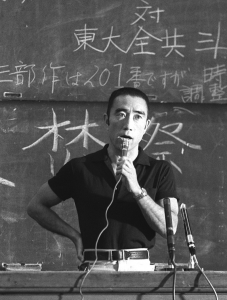The Anti-Revolutionary Manifesto
Posted By Yukio Mishima On In North American New Right | Comments Disabled 1,290 words
1,290 words
Translated by Riki Rei
Translator’s note: Mishima penned this essay titled “Anti-Revolutionary Manifesto” in early 1969, almost two years before his suicide, at the peak of Leftist protests, demonstrations, and riots, which were sweeping not just across Japan, but throughout the entire Western world. In this essay, Mishima debunked the deception of the communist ideology, explained why it is necessary to oppose communists and their collaborators, and expressed the conscious determination of himself and his men to combat the menace of communism.
First, we are not against all kinds of revolutions. We are against all kinds of plans and actions, regardless of their means being violent or non-violent, that are intended to link up communism with administrative power. Needless to say, such plots attempt to push for the establishment of the so-called “democratic coalition government” (pro-communist regime). We are opposed to all forms of linking up communism with administrative power, regardless of names or substances, refusing to be hoodwinked by their masks of either internationalism or nationalism, and avoiding being confused by their deceptive methods of either direct democracy or popular front.
The Communist Manifesto remarks as follows: “Communists openly declare that we seek to achieve our aims through, and only through, forcefully subverting all the existing social orders.”
What we are striving to protect are our Japanese culture, history, and traditions. According to the interpretations of their dialectical materialism, all these are certainly included in their “all the existing social orders to be subverted.”

You can buy Kerry Bolton’s Artists of the Right here [1].
Second, we are the last defenders and the ultimate representatives of the Japanese culture, history, and traditions that must be protected, and we consider ourselves the elite and spearhead of such a mission. We are diametrically opposed to all kinds of thinking that advocate for or imply a “better future society,” because future-oriented actions deny the matureness of culture, negate the nobility of traditions, and seek to transform the irreplaceable “now” completely into a process toward revolution. Embodying the historical continuum, manifesting the essence of history, demonstrating traditional aesthetic form, and making oneself the last sentinel; such a behavioral principle was the very principle that governed the conduct of the Kamikaze Tokkotai who left a testament citing: “Behind us, there will be an endless column of successors.” Such an idea of believing “an endless column of successors” is exactly one that is theoretically antithetical to the idea of “a better future society.” This is because every “successor” was an actor convinced that he was a member of the last sentinels taking the last stand, practicability not being a concern.
Third, we discerned that post-War revolutionary thinking has always revolved around the collective rationale of the weak. No matter how violently it shows itself, it reflects the mentality of the weak, which is inseparable from the collectivist rationale of certain groups or organizations. It sows the seeds of unrest, suspicion, antipathy, hatred, and jealousy, and uses them as materials for intimidation. It is a group movement that puts together the vilest and most ignoble sentiments of the weak and uses them for certain political purposes. Holding the banner of a vacuous, naïve, and deceptively pleasing ideology, basing it on and connecting it with the lowest sentiments of the weak, by which to win over half of the votes and “democratically” rule over various kinds of small groups and organizations, and through it to oppress the minority and permeate all fields of the society, that is their way.
We take the stance of the strong and start as a minority. Qualities of the Japanese spirit such as brightness and cleanness, generosity, integrity, and high morality are our possessions. Again, practicability is not an issue, because it is not our intention to place our very existence and action in the process toward the future.
Fourth, why are we against communism?

You can order Kerry Bolton’s More Artists of the Right, featuring Yukio Mishima, here. [2]
Firstly, communism is absolutely incompatible with our national identity i.e., our national culture, history, and traditions, and is theoretically incompatible with the existence of the Monarch, which is a unique and irreplaceable symbol of our historical continuity, cultural uniformity, and ethnic homogeneity.
The Meiji state had sought for an eclectic combination of the polity of Western Europe and the national character of Japan, and adopted an imitated political system of constitutional monarchy. Post-War Japan pulled away from this combination and chose to introduce a relationship of the two that is neither too close, nor too distant, characterized by parliamentary democracy and a symbolic Emperor, which instead highlighted the fundamentally cultural and non-political nature of the historical monarchic tradition. What should be restored is not the grotesque eclecticism, let alone something like Republicanism that destroys cultural continuity.
To manifest the true and rightful nature of the Emperor, we approve of the freedom of speech that is regarded as a virtue of the parliamentary democracy of modern Japan. This is because the essential character of Japanese nationhood that is both new and old and that deserves to be discovered, emerges precisely at the connection point between the whole Japanese culture system — guaranteed to the largest extent by freedom of speech — and the Emperor system as a cultural concept.
On the other hand, the pro-communist and the weak merely utilize freedom of speech as a means, process, and tactic, and argue that progressive values that theoretically promote revolutions lie in freedom of speech itself. This is a misperception. Although freedom of speech is the demarcation line of mutual compromise between human nature and politics, it also satisfies the minimal instinctual requirements of humankind at the same time. (Please refer to my thesis The State of Freedom and Power.)
At present, we do not possess a realistically better political system than parliamentary democracy composed of multiple political parties, as one that guarantees freedom of speech.
This compromise-based and purely technical political system, its shortcomings of lacking idealism and real leadership notwithstanding, is most suited to the protection of freedom of speech, and it alone is capable of countering and resisting totalitarianism which necessarily incorporates speech censorship, secret police, and detention camps.
Secondly, we are opposed to communism for the sake of protecting freedom of speech.
We aim to smash the nationalist mask of the Communist Party of Japan; in other words, to shatter the illusion of its humanistic-socialism that claims to achieve the protection of freedom of speech, through the Japanese way, for the first time in the world, as this political experiment of theirs, even if it is implemented as literally described, will immediately and patently reveal its horrifying one-party dictatorial nature once it succeeds.
Fifth, resorting first and foremost to speech struggle, economic struggle, and political struggle are their customary tactics, and “discussion” is but a ploy embedded in their tactics. Our fight only needs to be one round, and it must be a fight in which we put life and death at stake. After fighting the round we gamble with life and death, it is up to history, spiritual values, and moral principles to make the judgment. Our anti-revolutionary movement is a shoreline operation against the enemies. The shoreline refers not to the geographic shoreline of Japan, but the spiritual bulwark of us as individual Japanese. With the courage and confidence to go against the prevailing trend, we shall not mind becoming hated and despised enemies of the revolutionary masses. Bracing against the abuse and revilement, ridicule, taunts, and provocations from the masses and remaining steadfast and undeterred, we are resolved to commit our own lives to reawaken their eroded Japanese spirit.
We are the embodiment of the traditional aesthetics and virtues of Japan.
January, the 44th Year of Shōwa.